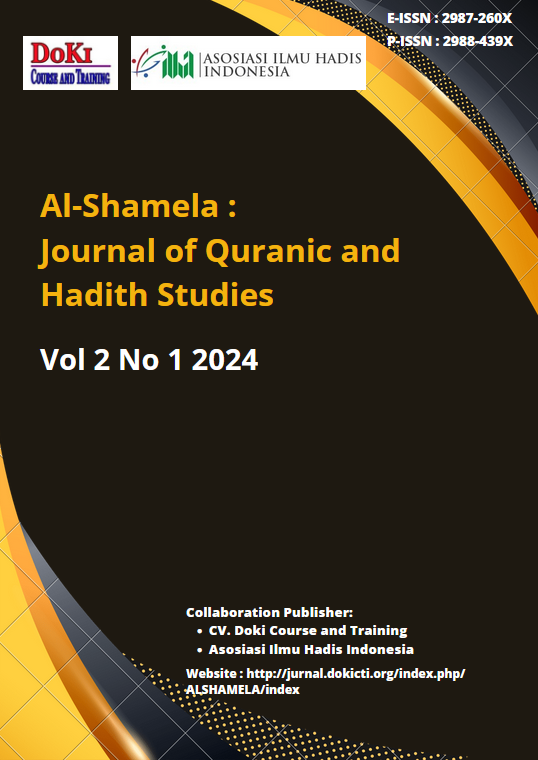The Relation of The Ministry of Religion's Interpretation of QS. Al-Ikhlas with The First Principle of Pancasila
DOI:
https://doi.org/10.61994/alshamela.v2i1.379Abstract
This article aims to explain the relationship between the interpretation of the Ministry of Religious Affairs and Pancasila, especially the first principle. This is motivated by the fact that the Ministry of Religious Affairs has provided signs for religious people to always maintain peace and harmony which includes three things, namely the relationship between followers of the same religion, different religions, and religious leaders with the government. This research uses a type of library research, descriptive analytical, which describes a problem by describing and analyzing the Ministry of Religion's tafsir book. Thus, this article concludes that the first principle in Pancasila, namely “Belief in One God”, contains a strong relationship with the meaning of QS. al-Ikhlash. With this relationship, one can understand the attributes of God that contain the teachings of monotheism so that the first principle of Pancasila can be said to be in accordance with Islam, because Islam upholds the omnipotence of God. The Ministry of Religious Affairs' interpretation of QS. Al-Ikhlas contains an affirmation of the purity of the Godhead and rejects all kinds of polytheism and explains that there is nothing like Him. This also applies to non-Islamic religions that recognize God as One, because the Ministry of Religious Affairs has given freedom to religious people to express their religious practices
References
Al-Marsudi, Subandi. Pancasila dan UUD'45 dalam Paragdima Reformasi. Jakarta: PT. Raja Gafindo persada, 2006.
Al-Shabuni, Muhammad ‘Ali. Shafwat al-Tafasir. Beirut: Dar al-Qur’an al-Karim, t.th.
Al-Zuhaili, Wahbah. Tafsir al-Munir fi al-‘Aqidah wa al-Syariah wa al-Manhaj. Beirut: Dar al-Fikr, 2009.
Alfian. Pancasila Sebagai Ideologi dalam Kehidupan Politik. Jakarta: BP-7 Pusat, 1992.
Andi, et al. “Stasiun Jatinegara Era Revolusi Kemerdekaan Indonesia 1945-1949”. Fajar Historia: Jurnal Ilmu Sejarah dan Pendidikan 5, no. 1 (2021).
Andrew, J. et al. “Analyzing the Factors that Influence Learning Experience through Game Based Learning using Visual Novel Game for Learning Pancasila”. Procedia – Social and Behavioral Sciences 157 (2019).
Anwar, Roshian. Ilmu Tafsir. Bandung: Pustaka Setia, 2005.
Ash-Shiddieqy, Muhammad Hasbi. Tafsir Al-Qur'anul Madjid An-Nur. Jakarta: Cakrawala, 2011.
Ash-Shiddieqy, Teungku Muhamad Hasbi. Tafsir Al-Qur’anul Majid An-Nur. Semarang: PT. Pustaka Rizki Putra, 2000.
Azzahrah, Azka Aulia & Dewi, Dinie Anggraeni. “Toleransi Pada Warga Negara di Indonesia Berlandaskan Sila Ketuhanan Yang Maha Esa”. De Cive: Jurnal Penelitian Pendidikan Pancasila dan Kewarganegaraan 1, no. 6 (2021).
Bo’a, Fais Yonas. “Pancasila sebagai Sumber Hukum dalam Sistem Hukum Nasional”, Jurnal Konstitusi 15, no. 1 (2018).
Budiarto, Gema. “Indonesia dalam Pusaran Globalisasi dan Pengaruhnya Terhadap Krisis Moral dan Karakter”. Jurnal Pamator 13, no. 1 (2020).
Dethan, Yuliana. et al. Ruqyah dalam Perspektif Tafsir Isyari: Telaah Penafsiran Imam Al-Alusi Dalam Kitab Ruh Al-Ma’ani. Al-Shamela: Journal of Quranic and Hadith Studies 1, no. 1 (2023).
Eko Zulfikar, et. al. “NKRI Harga Mati: Tinjauan Al-Qur’an Terhadap Urgensi Persatuan di Tengah Kebinekaan”. Jurnal Semiotika-Q: Kajian Ilmu Al-Qur’an dan Tafsir 3, no. 2 (2023).
Fajri, Nuril. “Diskursus Kontestasi Agama dan Negara”, Jurnal Ilmiah Sosiologi Agama 14, no. 1 (2020).
Handayani, Puji Ayu & Dewi, Dinie Anggraeni. “Implementasi Pancasila Sebagai Dasar Negara”, Jurnal Kewarganegaraan 5, no. 1 (2021).
Herman. Pancasila Dalam Kedudukan dan Fungsinya Sebagai Dasar Negara dan Pandangan Hidup Bangsa Indonesia. Surabaya: Usaha Nasional, 1981.
Iqbal, Muhammad dan Syauqi Aulade Ghifari. “Analisis Kontekstual atas Tafsir Departemen Agama Republik Indonesia”, Jurnal Iman dan Spiritualitas 2, no. 1 (2022).
Juneman. et al., “Symbolic Meaning of Money, Self-esteem, and Identification with Pancasila Values”, Procedia – Social and Behavioral Sciences 65 (2012).
Kaelan. Pendidikan Pancasila. Yogyakarta: Paradigma, 2000.
Kementerian Agama RI, Al-Qur’an dan Tafsirnya (Edisi Yang Disempurnakan). Jakarta: Lentera Abadi, 2010.
Lubis, Maulana Arafat. Implementasi pendidikan kewarganegaraan. Medan: Akasha Sakti, 2018.
Morfit, Micheal. “Pancasila: The Indonesian State Ideology According to the New Order Government”, Asian Survey 21, no. 8 (1981).
Munayyir, Ibnu. Al-Masa’il Al-‘Itazaliyyah fi Tafsir Al-Kasysyaf li Al-Zamakhsyari. Saudi Arabia: Dar al-Andalas, 1418 H.
Mulyono. "Pancasila Sebagai Orthodoksi Dan Orthopraksis Dalam Kehidupan Berbangsa dan Bernegara," Humanika 23, no. 2 (2016).
Nurafifah, Wulan dan Dinie Anggraeni Dewi, “Implementasi Nilai-Nilai Pancasila Dalam Kehidupan Bermasyarakat, Berbangsa, dan Bernegara”, De Cive: Jurnal Penelitian Pendidikan Pancasila dan Kewarganegaraan 1, no. 4 (2021).
Pohan, Fachruddin. Kembali Memahami Pancasila. Bandung: Citapustaka Media, 2002.
RI, Departemen Agama. Kompilasi Peraturan Perundang-Undangan Kerukunan Hidup Umat Beragama. Jawa Timur: Kantor Wilayah Departemen Agama.
Rohmana, Jajang A. “Memahami Al-Qur'an dengan Kearifan Lokal: Nuansa Budaya Sunda dalam Tafsir al-Qur’an berbahasa Sunda”, Journal of Qur'an and Hadith Studies 3, no. 1 (2014).
Rohmana, Jajang A. Perkembangan Kontemporer Tafsir di Indonesia: Gambaran Umum Tafsir Al-Qur'an di Tatar Sunda, dalam Abdul Mustaqim dkk., Melihat Kembali Studi Al-Qur’an: Gagasan, Isu dan Tren Terkini. Yogyakarta: Idea Press, 2015.
Santika, I Gusti Ngurah. “Tinjauan Historis Terhadap Keppres No. 24 Tahun 2016 Tentang Hari Lahir Pancasila”. Vyavahara Duta: Jurnal Ilmiah Ilmu Agama dan Ilmu Hukum 16, no. 1 (2021).
Saputra, Rofik dan Amir Ahmad, “RELASI NILAI NILAI PANCASILA DENGAN QS SABA’ AYAT 15 (Telaah Methode Tafsir Tahlili)”, Jurnal Mafhum 5, no. 2 (2020).
Shihab, M. Quraish. Tafsir al-Mishbah: Pesan, Kesan dan Keserasian al-Qur’an. Jakarta: Lentera Hati, 2002.
Sitorus, Jordan Hotman Ekklesia. “Pancasila-based Social Responsibility Accounting”. Procedia – Social and Behavioral Sciences 219 (2016).
Surdayanti, Dwiyani. et al., “Critical Analysis on Accounting Information Based On Pancasila Value”, Procedia – Social and Behavioral Sciences 172 (2015).
Suhartoto. “Refleksi Metafisik Atas Pancasila”, Jurnal Filsafat, 1996.
Tahar, M. Shohib. “Telaah tentang Tafsir al-Qur'an Departemen Agama RI”, Jurnal Lektur al-Qur'an 1, no. 1 (2003).
Wandani, Amalia Rizki dan Dinie Anggraeni Dewi, “Penerapan Pancasila Sebagai Dasar Kehidupan Bermasyarakat”, De Cive: Jurnal Penelitian Pendidikan Pancasila dan Kewarganegaraan 1, no. 2 (2021).
Zulfikar, Eko. Karakteristik Ulul Albab: Menuju Kepribadian Islami di Era Disrupsi Digital. Bogor: Guepedia, 2023.
Zulfikar, Eko. “Relasi Mahabbah Menurut QS. Ali ‘Imran [3]: 31 dengan Pancasila sebagai Ideologi Negara: Studi Pemikiran Imam al-Ghazali dalam Kitab Mukasyafat al-Qulub”, EAIC: Esoterik Annual International Conference (2022).
Downloads
Published
Issue
Section
License
Copyright (c) 2024 Salsabiela, Lukman Nul Hakim, Kamarudin (Author)

This work is licensed under a Creative Commons Attribution-NonCommercial 4.0 International License.











